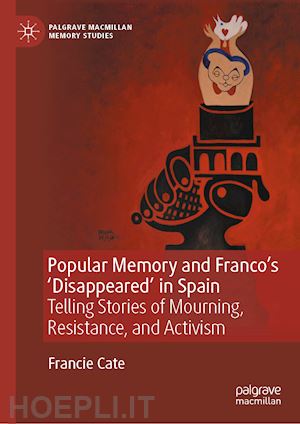
Questo prodotto usufruisce delle SPEDIZIONI GRATIS
selezionando l'opzione Corriere Veloce in fase di ordine.
Pagabile anche con Carta della cultura giovani e del merito, 18App Bonus Cultura e Carta del Docente
“Francie Cate’s Popular Memory and Franco’s ‘Disappeared’ is an obra magistral, an opus magnum, a masterwork. It is an in-depth and broad study in which further research on memory, imposed forgetting, counter-memory, and the dynamics of cultural memory will be rooted.”
– Maureen Tobin Stanley, University of Minnesota Duluth, USA
This book examines a "people's history" of the Spanish Civil War's anti-fascists who lost their 1936-1939 fight against far right military insurgents. The book argues that the regime’s “disappeared” have in fact since 1936 been the most visible protagonists safeguarded in the shared collective memory of the war’s losers. Narratives about Franco’s up to 150,000 civilian shooting victims—stories told in the form of memoirs, political speeches, visual art, film, novels, and oral testimonies—form the centerpiece of this study. How have these narratives told by the war’s losers--focused explicitly on the figure of the dead body—been mobilized in periods of political upheaval from 1936 to the present, including WWII; the 1950s and 60s of the Cold War; the 1970s and 80s Spanish Transition; ongoing mass media “culture wars” that have polarized the Right and the Left since public exhumations of unmarked graves began in the year 2000?
Through fieldwork in the province of Cádiz, the authorhas also recorded interviews with family members of citizens who were murdered. Through oral narratives, an entire community—violently punished during the years of the dictatorship—succeeded in keeping alive an alternative history of the pre-war enterprise to establish the 1931 Spanish democratic Republic and to build a modern nation bound by constitutional law. The discursive commonalities identified in the wide-ranging testimonies—including pioneering researchers’ publications beginning in the 1970s—constitute a fascinating textual topography of popular cultural memory. This book argues that this treasure trove of storytelling preserved an initially clandestine counter narrative of anti-Francoist resistance, as well as dreams of justice for the dead.
Part I: Representations of the Murdered Body of the War’s Losers: The Discursive Life and Death of Amparo Barayon: A Case Study.- Chapter 1: Claims of Crimes Against Civilians for an International Audience, 1936-1946.- Chapter 2: Blood and Song: Creative Forms in Exile for Mourning the Dead, 1946-1959.- Chapter 3: Bodies in Transition during the Post-Franco Period: Buried Truths in Spain.- Chapter 4: The Polemics of Breaking Family Silences: Ramon Sender Barayon’s Return to the Scene of the Crime.- Part II: Franco’s Fusilados and Popular Memory: Tearful Topographies of Political Dissidence.- Chapter 5: The Politics of Mourning in the Postwar: State Spectacles & Small Circles of Sorrow.- Chapter 6: A Testimonial Typology: Charting Franco’s Repression in the Popular Imaginary of Andalucia.- Chapter 7: Recording Twenty-first Century Oral Narratives in the Province of Cadiz.- Part III: From Private Pain to Political Activism: Exhuming the Remains of Franco Repression in the Province of Cadiz.- Chapter 8: The Political Passage from Personal Grief to Collective Agency: Government-Sponsored Projects to Unearth Hidden Histories.- Chapter 9: Affective Ties, Political Bonds, and Media Visibility: Reclaiming the Spaces of History in Puerto Real and El Marrufo-La Sauceda.- Chapter 10: Memory Associations and Activism: A Case Study of AMEDE, San Fernando.- Chapter 11: Conclusion: Traces, Sites, and Sounds of Franco Repression in the Popular Imaginary.
Francie Cate is Chair of the Department of Modern Languages and Literatures and William R. Kenan, Jr. Professor of Hispanic Studies at William & Mary, USA. She is the Editor of the book series, Faro de la Memoria (University of Cádiz Press). She is the author of Spanish Culture Behind Barbed Wire: Memory and Representation of the French Concentration Camps, 1939-1945 (2004), published in Spanish in 2012.











Il sito utilizza cookie ed altri strumenti di tracciamento che raccolgono informazioni dal dispositivo dell’utente. Oltre ai cookie tecnici ed analitici aggregati, strettamente necessari per il funzionamento di questo sito web, previo consenso dell’utente possono essere installati cookie di profilazione e marketing e cookie dei social media. Cliccando su “Accetto tutti i cookie” saranno attivate tutte le categorie di cookie. Per accettare solo deterninate categorie di cookie, cliccare invece su “Impostazioni cookie”. Chiudendo il banner o continuando a navigare saranno installati solo cookie tecnici. Per maggiori dettagli, consultare la Cookie Policy.